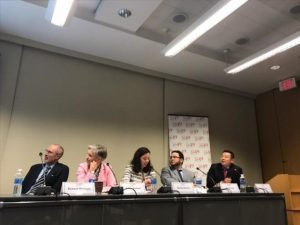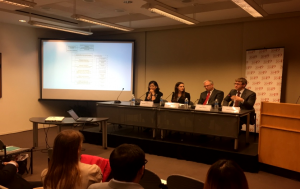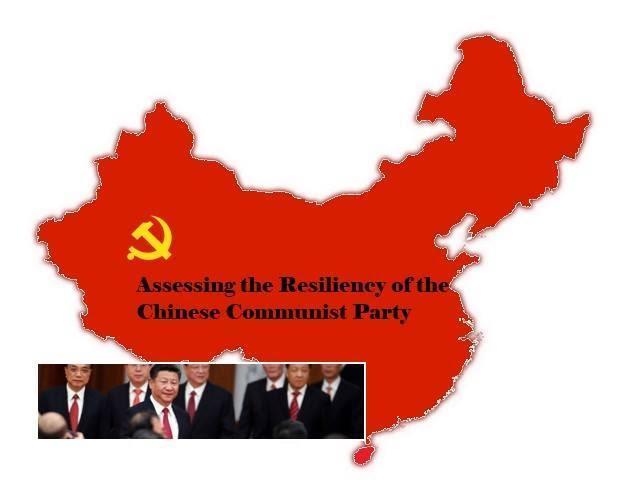
U.S.-Taiwan Relations in a Sea of Change
March 16, 2018
White Warships and Little Blue Men: The Looming “Short, Sharp War” in the East China Sea over the Senkakus
March 30, 2018By: Emily David and Gary Wang |
Watch a video of the conference here.
At the 19th Party Congress in Beijing, Chinese leaders projected an image of China (People’s Republic of China, PRC) as a strong and united country destined to become a new global leader. However, the extraordinary measures undertaken to control information, assembly, and capital outflows suggest the Chinese Communist Party (CCP) may be weaker than it appears. China, under the rule of the CCP, has denied its people their natural rights, including freedoms of assembly, thought, and expression. Since the late 1970s, the PRC leadership has pursued a policy of “reform and opening” that has advanced the Chinese economy, while ensuring the Party’s continued monopoly on all forms of political power. The 13th National Party Congress’ ratification of the abolished presidential term limit is the latest and most consequential move aimed at ensuring General Secretary Xi Jinping’s all-encompassing rule. This ideologically retrograde path has resulted in considerable tensions within Chinese society. As China continues to emerge as a globally-interconnected power, questions have arisen regarding the trajectory of its political system. While much discussion in Washington has focused on the future of U.S.-PRC relations, it is imperative to assess the resiliency of China’s party-state apparatus, and to examine its implications for U.S. interests in the future.
Conference on the Resiliency of the CCP
Â

(Left to Right: Richard McGregor, Nadège Rolland, Rachael Burton, David Gitter, and Yang Jianli Source: The Project 2049 Institute)
The CCP and Its Standing Today
The overall course emerging from Xi’s China is a more public role for the Party, and a bolstered relationship between the Party, the government, and the private sector. On the whole, it is clear that the Party is extremely resilient at this current point in time.
The CCP’s Propaganda ApparatusÂ
At the center of the propaganda apparatus is the socialist core value system that emphasizes principles such as prosperity, democracy, civility, freedom, rule of law, and patriotism, as defined by the Party. Xi has emphasized the integration of core socialist values into every aspect of Chinese society as an important element of “cultural soft power.” However, a challenge the CCP faces is the impetus behind Party membership. Currently, most Party members join to improve their own status and self interest, rather than out of ideological adherence or Party loyalty, which exposes an ideological vacuum in Chinese society and in the Party itself. Whether or not Party members will be willing to weather a crisis or a democratic uprising will play a part in determining the Party’s future. As for now, the propaganda apparatus continues to target domestic and foreign audiences to reinforce the role of the Party in this “new era.”
CCP Global Influence
Economically, OBOR allows the CCP to maintain state control over the economy, and to sustain its manufacturing and production industries, therefore providing the continual economic growth necessary to sustain CCP resiliency. Strategically, OBOR is a foreign policy tool that helps to secure trade routes, and carves areas for potential political influence through infrastructure projects (dams, fiber optics, highways, etc.). Domestically, it works to reduce development gaps and provincial disparities, diminish social unrest, and discourage radicalization and terrorism. Internationally, OBOR limits democratic institutions along China’s borders, and reduces the risk of democratic contagion, and the CCP’s branding and messaging of OBOR works to raise China’s status as a great power and provider of public goods. It also allows China to take the lead on global initiatives that are widely recognized as having the potential for far-reaching global impact. However, diverted wealth, economic overstretch, and conflicts in recipient countries are just a few potential challenges impeding the success of China’s OBOR strategy. Additionally, the success of OBOR will largely rest on recipient countries’ perception of China’s plans.
Chinese Democracy Movement vs. the CCP
While not successful, the Tiananmen democracy movement ultimately created fear among the top echelon of Party officials because it called into question the legitimacy of the regime. As such, the Movement forced the CCP to recognize that the Party’s staying power in the 90s had nothing to do with communist ideals; instead, economic growth and nationalism became the dominant sources of CCP legitimacy. Later in 2008, Liu Xiaobo and 300 other Chinese intellectuals and human rights activists authored the Charter 08 document, which called for a “modernization” of Chinese society built on a new constitution, separation of powers, legislative democracy, and the freedom to assemble (to name a few). The Charter was deemed a “subversion of state power.” Now, with Xi Jinping as Chairman, there has been a significant shift in leadership style; the Party’s role in Chinese society has been repurposed, and has had three major effects on China: 1) the CCP is more ideological and authoritarian, 2) the country’s elites are potentially alienated due to the restructuring of “crony capitalism,†and 3) no one social strata provides Xi with vehement public support. So, while there are definite cracks in the Party’s resiliency, the potential for the emergence of a contemporary democratic movement does not pose an immediate threat to the CCP.
Future Scenario: An Asia without the CCP?

(Left to Right: Kuniko Ashizawa, Emily David, Mark Stokes, and Peter Mattis. Source: The Project 2049 Institute)Â
The CCP’s Security ApparatusÂ
At its foundation, the CCP is a security organization aimed at shaping itself and the outside world. China’s security organizations serve the top-level leaders, and, therefore, are the instruments through which power is exercised and competed for. Given that security, according to the CCP, ultimately hinges on social order and Party management, it is advantageous for the CCP to incorporate entities such as the Propaganda Department, the Organization Department, the Political Legal Commission, and the People’s Liberation Army (PLA), etc. into the core of the state security apparatus structure. Although the Ministry of Public Security (MPS) and the Ministry of State Security (MSS) are State Council organizations, they are also meant to serve the Party. Together, China’s security organizations serve primarily as a tool of the Party against outsiders. For its part, the PLA is the armed wing of the CCP that oversees the armed forces and the paramilitary People’s Armed Police (PAP), which both have propaganda and political warfare missions. As such, since the PLA is the final arbiter, the key question in the rise or fall of the CCP is based upon the PLA’s disposition to defend the Party against the people. However, the additional entities in China’s security apparatus exist to ensure that the PLA never has to make that choice. They serve as a buffer between the PLA and the Party, to guarantee that a viable opposition never comes to fruition. Taken together, the future of China largely depends on the loyalty and effectiveness of the CCP’s collective security apparatus.
Regional Implications: Addressing a China in Political TransitionÂ
In terms of a regional response to the potential collapse of the CCP, the role of the world’s third largest economy would be difficult to ignore. Japan has historically been a stakeholder in the event of a collapsed Chinese state (fall of the Qing Dynasty), but its physical, political, economic, and military expansion into China came at great consequence to the people in the region. However, in the aftermath of the Tiananmen democracy movement, when the CCP appeared most vulnerable, Japan was the first of the G7 countries to lift economic sanctions and resume diplomatic channels. Taking history into account, in a future collapse scenario, Japan could offer limited diplomatic or economic engagement in selective regions in China. This new initiative could act as a network―with an emphasis to support Chinese citizenry, civil society, and private industry― linking the coastal cities of China to Japan, and to other states in the Asia-Pacific.
Conclusion
The Chinese Communist Party under Xi Jinping is broadly resilient, determined, and strong. Through the use of reforms within the propaganda and security apparatus, China is experiencing widespread state control over society. Internationally, OBOR serves to offset many of the Party’s existing challenges, and appears to amplify its position on the world stage. Yet, despite all of this, an authoritarian power that denies its people basic rights of free expression, religion, and assembly is never exempt from possible dissolution, and there are many cracks within the Party’s current façade. In the event that China’s one-party rule is dismantled, Taiwan, and other regional stakeholders such as Japan, South Korea, and ASEAN, all have a role to play in stabilizing the region through China’s political transition. In this regard, the resiliency of the CCP is therefore a priority for Xi Jinping. Under his leadership, the strengthened position of the CCP’s propaganda and security apparatus ensure the continued “fighting spirit” necessary to exercise strict governance over the People’s Republic of China.
Emily David is a Research Associate at the Project 2049 Institute where her research focuses on the Chinese Communist Party, Chinese influence operations, and U.S.-Taiwan relations. She recently completed her Master’s degree in Chinese Politics, Foreign Policy, and International Relations at Tsinghua University in Beijing, China.
Gary Wang was an intern at the Project 2049 Institute where his research focused on cross-Strait relations and U.S.-Taiwan relations. He is currently pursing his BA at George Washington University.




